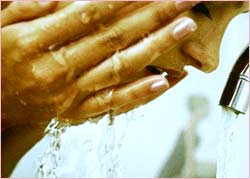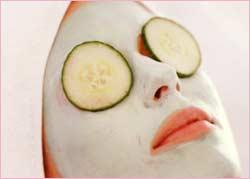You left home to buy a moisturiser. That's all you needed. But at the department store or cosmetic shop, umpteen bottles in attractive packaging catch your eye. Confusion sets in.
 Should you just stick to the moisturiser or pick up a face wash, a scrub -- the whole gamut, as well?
Should you just stick to the moisturiser or pick up a face wash, a scrub -- the whole gamut, as well?
We launch a new series on beauty/ grooming products to help you get consumer-savvy.
First let's look at the most common skin products in the market and find out whether you really need them.
-
Do you have a skin query for Dr Parul Kolhe? Write to us!
Moisturiser
Your daily moisturiser prevents water loss from your skin cells, keeps them hydrated and nourished and provides a protective barrier from the elements.
For this reason, it must contain a sunscreen of at least an SPF 10 (Garnier's Sun Control Moisturiser costs Rs 115 for 100). For indoor use, a moisturiser without sunscreen will do as well.
Aloe vera, sunflower oil, glycerine are all good moisturisers and should be present in the ingredients list of your product.
Face lotions, body lotions and foot/ hand creams all moisturise your skin. But, though the ingredients in a body lotion are similar to a face lotion, the formulations are slightly different; the former needs to be oilier to give more protection to parts exposed to trauma (injury due to wear and tear) like hands and feet.
Also, hand and foot creams may contain salicylates or urea to dissolve thick calluses; if used on the face, it could burn or damage your delicate facial skin. So, use products only for the body part it is meant for.
A word of caution: no lotion, medicated or otherwise, can cure cellulite (dimpling of skin on thighs and buttocks due to fat deposits) or dissolve body fat, so don't waste your money on such empty promises.
The verdict: A good moisturiser is an absolute must for any person, man, woman and child alike. If I had to recommend only one skin product that can't be done without, this would be it.
Night cream
Any cream gets an undisturbed eight hours to work on your skin if applied before you sleep. Night creams hydrate the upper layer of skin cells, making them plumper; therefore, your skin look smoother, shinier and tighter.
~ Creams with ceremides or alfa-hydroxy acids smoothen fine lines and wrinkles and act as anti-ageing products (Garnier's Wrinkle Lift A at Rs 172 for 50 ml).
~ Creams with hydroquinone or retinoids remove pigment from the cells of the skin's upper layers and act as whitening agents (L'Oreal's White Perfect Night Cream at Rs 600 for 50 ml).
~ Creams with aloe vera, jojoba extracts or glycerine help new cells grow faster and act as repairing agents (Alonurish Alnite cream at Rs 95 for 50 ml).
Never use night creams in the daytime as they may contain ingredients that sensitise your skin to sunlight.
The verdict: Night creams are luxury products. A young person with normal to oily skin can actually do without them but some sort of night application, even if it is just a plain moisturiser, is an absolute must for dry skin.
 Face wash
Face wash
This is perhaps the most commonly used product and yet the most carelessly chosen. A face wash should remove dirt, grime and excess oil from your face without stripping it of all moisture.
Your facial skin has a certain natural pH, which is acidic (pH is the measure of acidity or alkalinity -- the lower it is, the more acidic the substance).
Using a harsh soap can change the pH to alkaline, which would be favourable to bacterial infections that cause acne. Even the mildest of soaps (with the exception of Dove) are alkaline
You should be careful, therefore, to use a pH balanced face wash (it keeps your skin at the correct level of natural acidity) such as Neutrogena (Rs 285 for 200 ml) or Johnson & Johnson's pH balanced face washes (Rs 225 for 150 ml). Another option would be to use a pH restoring toner after washing.
Specially formulated soap free cleansers are available for dry skin; these contain stearyl alcohol or isopropyl alcohol and glycerides that hydrate and moisturise the skin as they clean and leave a film of moisturiser on your face, like the Cetaphil Cleanser (Rs 185 for 100 ml).
Oily-skinned people, however, should opt for mattifying washes that do not add moisture and degrease the skin (Lakme Matteffect at Rs 85 for 100 ml).
Face washes that contain salicylic acid are especially good for acne prone people as they reach into your pores and unplug blackheads that are the forerunners of acne.
The verdict: I personally feel that face washes are an essential in your daily skin care kit, so it is definitely worth spending on.
Face scrub
These products, which contain granular residues that may comprise ground apricot kernels, walnut shells or synthetic granules in a cream base, do the following to your skin:
~ Remove the deposits of grime and dead skin cells.
~ Your pores are unclogged.
~ Blackheads removed and a fresh inner layer of skin is revealed.
~ It makes your skin look smoother and can get rid of pigmentation when used regularly.
Homemade scrubs with sugar granules or 'besan' are economical, but may have uneven rough edged particles causing scratches. Marketed scrubs have uniform rounded granules with lesser chances of damage.
Scrubs also incorporate other ingredients like alfa hydroxy acids which dissolve the upper dead layer of skin making it easier to remove (St Ives Apricot AHA Scrub is Rs 155 for 175ml and Lakme's Apricot Scrub at Rs 55 for 50 ml are effective and pocket friendly).
Elderflower, Vitamin E and ginseng are anti-ageing and whitening ingredients present in some scrubs. To allow your skin to regenerate between exfoliation, use scrubs only two to three times per week.
The verdict: Though not an absolute necessity for all of us, this product can be used with discretion only before 'Have to look good' occasions.
 Face pack
Face pack
Face packs are usually used after a facial, but can be applied by themselves, once or twice a week.
It is applied as the last step of a facial after cleansing, massaging and steaming that are the initial steps of a facial.
They consist of a paste like base that should be applied as a thick layer and left to dry (about 15 minutes). During this time, the added active ingredients can improve your skin quality.
Here are some of the ingredients present in the face packs along with their benefits:
~ Liquorice, bear berry or tomato extracts for whitening ie removing isolated dark marks or blotches.
~ Lactic acid (milk packs) for softening and fairness (improving the overall colour of your skin).
~ Honey for hydrating the upper layer of skin.
The verdict: A face pack is a 'feel good' product, which is pampering but not necessary. You don't need to splurge on them routinely. Use once in a while, for that extra confidence.
So here's hoping you no longer have to stand in front of the cosmetics counter at the supermarket, scratching your head in confusion.
Just reach out for what your skin needs.
-
Do you have a skin query for Dr Parul Kolhe? Write to us!
Dr Parul S Kolhe is an M B B S, DDV and DNB in dermatology.





